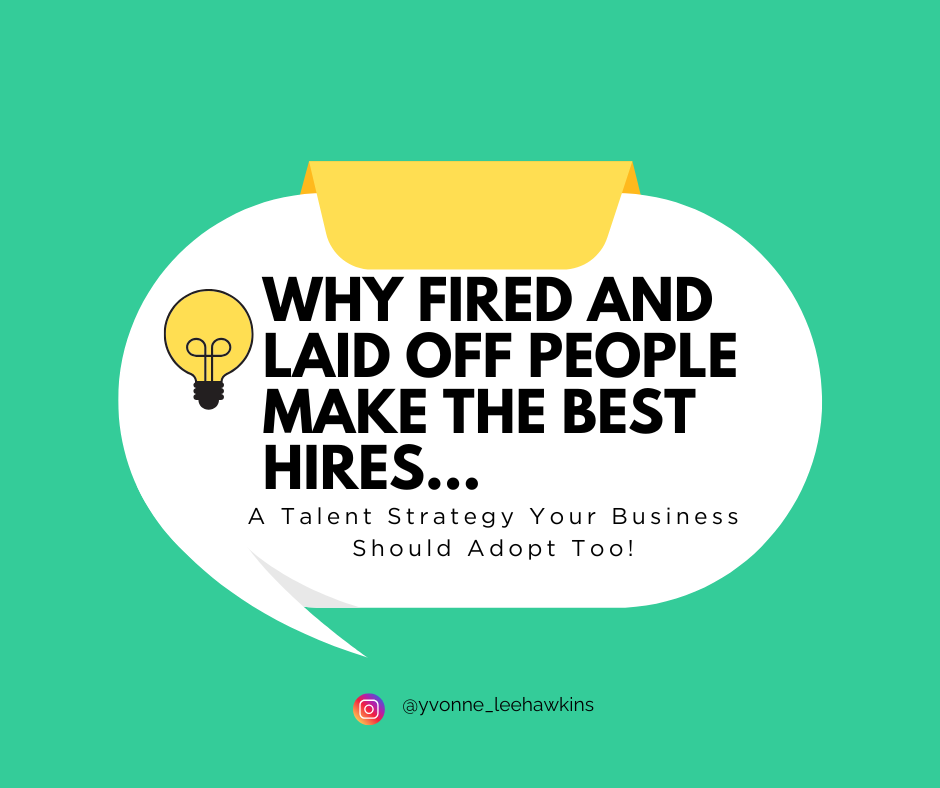There’s a quiet shame many people carry after being fired or laid off. At first it seems like a scarlet letter in the corporate world, a mark that too often whispers “not good enough” in interviews and inner monologues alike. But here’s the truth: I like hiring people who’ve been let go.
In fact, I look for them.
Let me explain.
Over the years—both in leadership and in coaching—I’ve noticed a striking difference between people who’ve coasted through a career of annual promotions and those who’ve hit a wall, been humbled, and had to rebuild. One group often “shows well” on paper. The other group grows well in reality.
Adversity Builds More Than a Résumé
When someone’s been laid off, fired, or displaced, they’ve been cracked open. They’ve had to look inward, ask hard questions, reassess their value, and reimagine their future. That kind of introspection breeds self-awareness and emotional intelligence. And self-awareness and EQ? Those are superpowers in the workplace.
These candidates don’t assume success is inevitable. They don’t cling to outdated methods or coast on reputation. They’ve learned to adapt. To problem-solve. To own their story.
And they carry something most top performers forget they need: humility.
Let’s be honest—many people who get promoted every year are great at navigating systems, impressing decision-makers, or delivering predictable results in low-risk environments. They know how to play the game. That’s not bad. But when the system changes, the playbook no longer works, or the business hits turbulence, who do you want on your team?
I want the person who’s already survived impact. Who’s had to face defeat and find a new way. Who knows what it’s like to have the rug pulled out and still find their feet.
I’ve learned to look beyond polished resumes and ask myself: Who’s done the real work?
Three Things to Consider as a Hiring Manager
If you’re in a position to hire, lead, or influence hiring decisions, here are three mindset shifts to help you spot underrated talent:
- Don’t confuse polish for grit.
That candidate with a straight line of promotions? Great. But ask: when did they have to stretch beyond their comfort zone? When were they wrong? When did they fail forward? Smooth career paths don’t always produce the most resilient performers. - Value emotional resilience.
People who’ve been let go and have done the work to process that experience often come in with something many others lack: emotional depth. They’ve rebuilt their confidence, redefined their identity, and are deeply committed to showing up differently. That’s gold in any high-stakes environment. - Ask for the story, not just the success.
Instead of asking, “Tell me about your biggest achievement,” try, “Tell me about a time you got knocked down and what you learned.” The answers will reveal more about mindset, maturity, and motivation than any list of bullet points.
People who have had to own their failure, learn a lesson, and have come back for more are the ones who will see you and your team through the next challenge. They bring experience and grit needed in the business world. There’s a “nothing to lose” attitude that breaks the norm and moves industries forward.
I’ve lived this truth firsthand. Years ago, I was let go from a role I had been promoted into—a move that initially felt like a major career blow. The leadership team that believed in me had moved on, and the new leaders didn’t value my strengths. For a moment, I doubted myself. Maybe they were right? But soon after, I joined a team that needed exactly what I had to offer. They appreciated my unconventional thinking and saw value in my willingness to experiment and learn on the fly. My growth there was not limited, and even better, the new job paid 50% more than the one that let me go. Today, I’m genuinely grateful for that setback. It pushed me out of a place where I was no longer seen, and into a company that not only valued me, but was filled with people who worked the way I do.
Years later I learned the quote “rejection is just redirection,” and in life and business, I have to whole heartedly agree.
If You’re Job Hunting After a Setback, Consider These Three Things
If you’re currently job searching after being fired or laid off, take a deep breath. You’re not broken. You’re in the middle of your resilience story. Here’s how to own that:
- Reframe your narrative.
You are not your last job. And you are not your last manager’s opinion of you. Reframe your experience in terms of what it taught you. Did you learn how to lead through uncertainty? Navigate hard conversations? Rediscover what lights you up? Talk about that. - Build your bounce-back mindset.
Yes, it’s tempting to lead with a chip on your shoulder. That last toxic manager was bad news. But instead of focusing on that, lead with clarity and confidence. Use this chapter to get laser-focused on what you want, and what you don’t. Interviewers don’t need your war story, they need your wisdom. - Look for humans, not just jobs.
When interviewing, pay attention to how companies treat people who’ve faced adversity. Do they ask thoughtful questions or dance around your gap like it’s radioactive? Look for leaders who see your story as an asset, not a liability.
The Bottom Line
Resumes tell a story. But they don’t always tell the whole story.
Behind every layoff is a lesson. Behind every firing is a fork in the road. The people who’ve walked those paths, who’ve had to sit with doubt, rise from disappointment, and keep going. These are often the ones who bring heart, hustle, and humanity to their next role.
So, this Wellness Wednesday, I invite you to shift the lens.
Whether you’re hiring or healing, remember: the most powerful growth doesn’t come from never falling—it comes from rising differently each time we do.
Let’s Talk About It
Have you hired someone others might have overlooked? Or have you bounced back from a setback in your own career? I’d love to hear your story. Drop a comment, reply to this newsletter, and share this with someone who needs the reminder that their next chapter might just be their strongest yet.
***
Did this topic add value to you? Please like and subscribe if you want more topics like this, or DM me. I always love suggestions and feedback!
And if you are too burned out and overwhelmed to even begin to use any of these strategies it might be time to get some help. Find a coach, therapist, or doctor who can help you reverse out of the physical, mental, and emotional symptoms of burnout so you can get back to living in life you love.
Remember, Self-care isn’t selfish…it’s required!
Yvonne Lee-Hawkins, IPHM, is a holistic Leadership and Wellness coach, stress strategist, and writer, who spent 20 years in corporate and leadership functions while also being a wife and mom of three amazing kids. You can find out more on her website, or follow her on Instagram, LinkedIn, or Medium. If you want some help beating burnout and all that comes with it, schedule a call here.
Lastly, sharing is caring. If you know someone who would benefit from this article, please forward it to them!

